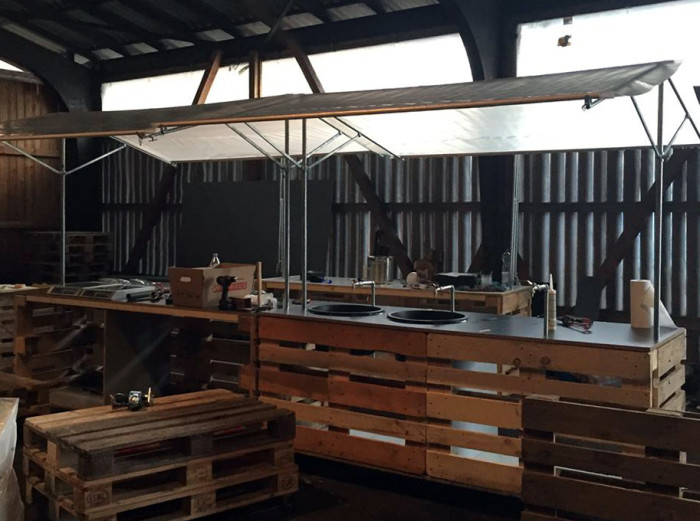22 June 2016
Presentation and Theatre

Collective Dinner
Date and Time: 22 June 2016 (Wednesday), 6:00pm
Venue: Duttweiler-Areal, 8005 Zurich, between crossroad Pfingstweidstrasse/Duttweilerstrasse and footbridge Gleisbogen (Directions)
Presentation: In Search of Land Art in Hong Kong
Date and Time: 22 June 2016 (Wednesday), 8:00pm
Venue: Duttweiler-Areal (Directions)
Presented by: Vincci Mak, curator
Land Art is an art genre emerged in the 1960s in Europe and America. Instead of creating works for museums and galleries, artists allowed their artworks to interact more directly with the landscape. In Hong Kong, where land problems prevail, many local artists have created artworks that integrate with the unique landscape of our city, and at the same time address local land development and environmental issues.
This exhibition selects land-related art projects by five artists generated in Hong Kong in the past ten years, and explores how they relate to land art projects in the 1960s in terms of form and content, as well as respond to Hong Kong’s unique development context of the 21st Century.
Improvised Silence Theatre: 6 Hours
Date and Time: 22 June 2016 (Wednesday), 9:00pm
Venue: Duttweiler-Areal (Directions)
Performed by: NuDD
One Soul from Dawn – One Soul from Ocean
NuDD captures moments. Every event at a unique setting, be it urban or natural, our model-performers’ motions and emotions are recorded and reinterpreted by creative minds that happened to gather at the same place at the same time.
“6 Hours” is a pilgrimage to connect places and rewind time through exhibition, land art and theatrical dance.
This is a 3-hour experimental performance with 6 stages of explorations on the theme of “time”. We invite all participants to bring your own sketchbook, drawing tools and a drink.
Credits: Karbi Chan, NuDD; Yat Sing Ha, NuDD; Vincci Mak, Land Vision; Dipsy Ha, Soundtube; Eva Maria Küpfer, Dancer
Donate to Curate — Manifesta 11 Parallel Events
Social repression and economic growth seem to be common characteristics of globalization in our cityscapes. The recapitalization of the city sets free unbridled forces of capitalist power, against which resistance seems almost impossible, even within the somewhat moderate context of Zurich. What then to do when our labour towards a new conception of the city remains unremunerated? What do people do for little or no money?
The processes of individualisations, which have been set free by neoliberalism and the recapitalisation of the city, must be countered by new forms of living and working. This is especially the case given that capitalism has been allowed to expand unchecked in the arts. It doesn’t need to be this way. Solidarity instead of individualisation, closed-circle economy instead of garbage incineration, sufficiency instead of blind consumption, questioning of food production processes, and development of new models of reuse. No heterotopias are required, rather concrete examples, places where our society can be reflected upon, and which are based on trust and mutual concern, ones that involve as well a concern about our relationship with nature.
With this as our purpose, we will set up a point of exit, located in a small courtyard stuck between thoroughfares, at the gateway to the city, between the university of the arts and grand hotels, next to start-ups and real-estate investors. We want to fill the space with that which others no longer use, what they throw out, and through this generate a new proposal for the city. Our open-source glossary archives and combines all those activities that take place in this context, without any claim to completeness.
About Slow Spicy Curatorial Practices
As an open collaboration based in Zurich and Hong Kong “Slow Spicy Curatorial Practices” reflects on contemporary curatorial practices and wants to share questions, urgencies and working practices: What is curating in times of globalization and crisis? What are the intangible value of our work? How do people incorporate and contrast mobility as a central demand of a globalized world with our own, personal engagement? And how could curating (lat. curate – to take care of) be understood as a way of caring through gestures of hospitality, sharing and of care?
www.donatetocurate.com
www.slowspicy.net
